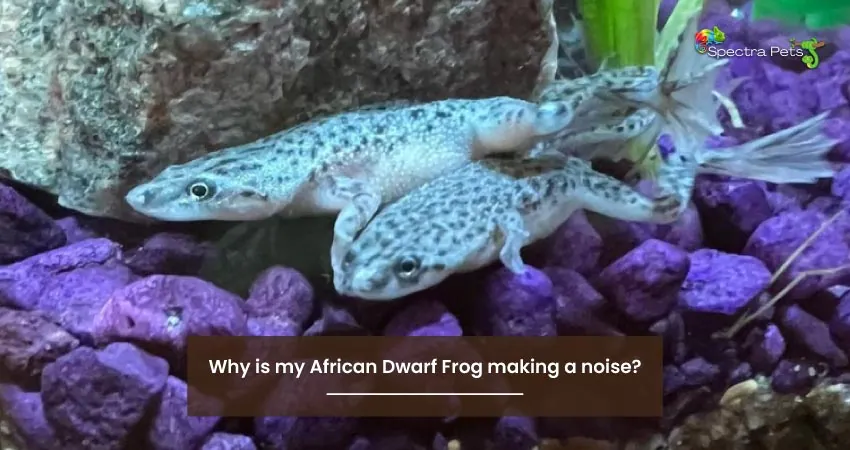All the frog species in the world make different kinds of noises. They can range from loud croaks to harsh screeches to mild hummings. The noises that frogs make are an indication of various things, such as season change, calling for mating, singing, or even discomfort.
Well, the sound that African dwarf frogs make cannot exactly be described as “noise.” Being aquatic frogs, they stay underwater for most of their time. While underwater, they occasionally make a sound that is more of a buzz. It can be considered a form of singing and can be quite loud. You’ll hear this most often at night, although sometimes they sing during the day as well.
Let’s find out why exactly the African dwarf frog species buzzes.

Why do African Dwarf Frogs buzz?
If you hear your African dwarf frog making a buzzing noise, then most probably a male frog is singing in order to attract the female. It usually happens when the frog is sexually mature and ready to reproduce. And they can make a variety of noises.
It is very important to know that only male frogs tend to make such noises; females do not make such loud sounds.
They usually begin to sing at night because of their nocturnal nature. If you have multiple of them, they will start competing against each other to attract the female, which can eventually turn into an orchestra!
However, there are instances where an African dwarf frog will sing or hum even if there’s no female around, sometimes it’s just in the mood to sing.

Instances of Vocalization in African Dwarf Frogs
African Dwarf Frogs have a fascinatingly diverse range of vocalizations, each carrying its unique context and meaning. Their sound repertoire, from mating calls to distress signals, is an acoustic reflection of their behavior and environment.
While it can be challenging for an untrained ear, African Dwarf Frogs produce several distinguishable sounds:
- Mating Calls: A characteristic humming or singing sound, primarily made by males to attract females. Interestingly, research has shown that the quality of this call can determine the male’s success in attracting a mate.
- Distress Sounds: When threatened or stressed, these frogs make a sharp, high-pitched sound, distinctly different from their other vocalizations.
- Feeding Sounds: While less common, some frogs have been observed making faint clicking or smacking noises while feeding.
As intriguing as these sounds are, their practical understanding is equally crucial.
Each sound, each hum, buzz, or squeal of these frogs holds meaning. A recent study published in the Journal of Herpetology highlighted how these frogs use sound as a complex communicative tool.
Mating calls are often soft, rhythmic, and musical. Frogs usually produce them during mating seasons or when a new female is introduced into the habitat.
On the other hand, the distress sounds are sharp and sudden, indicating immediate danger or discomfort. If you hear these, it may mean that your frog is feeling threatened, either by a sudden change in the environment or perhaps the presence of a potential predator.
Differentiating Frog Noises from Other Ambient Sounds
While the sounds of African Dwarf Frogs are unique, they can be subtle and sometimes masked by ambient noise. This masking can be especially prevalent in an aquarium setting where water pumps, filters, or other animals can produce sounds. The key is to listen for the distinct rhythms or changes in the sound pattern that could indicate your frog’s vocalizations.
Why Do African Dwarf Frogs Make Noise?
Communication is at the heart of why African Dwarf Frogs make noise. Just like birds chirping or dogs barking, each sound made by these frogs carries a message.
As a Mean of Communication
Communication among African Dwarf Frogs is multifaceted, involving visual, tactile, and auditory cues. Among these, sound plays a pivotal role, especially in contexts where visual or tactile cues may be limited. For example, during the night or in densely planted aquariums, sound becomes the primary communication mode.
Noise as a Sign of Stress or Disturbance
The connection between stress and vocalization in African Dwarf Frogs is clear. When threatened or uncomfortable, they make specific distress sounds. These sounds are a direct indication that the frog feels threatened, providing a crucial signal for owners to intervene and adjust the environment if necessary.
Role of Noise in Mating Rituals
One of the most fascinating uses of noise in African Dwarf Frogs is during mating rituals. Males produce characteristic mating calls to attract females. In fact, a 2018 study found that females show a clear preference for males with longer, more complex calls, making sound an important determinant of mating success.
It’s important to remember that the frequency of these sounds can vary widely.
How Often Do African Dwarf Frogs Make Noise?
A range of factors influence how often your frog might make noise. Their comfort level, health, time of the day, and presence of potential mates can all affect their vocal activity.
Factors Influencing the Frequency
The frequency of frog noises can be influenced by several factors, including:
- Environment: Frogs in comfortable, stress-free environments tend to vocalize more frequently. On the other hand, sudden changes in temperature, lighting, or water quality can cause stress, reducing the frequency of sounds.
- Health: Sick or injured frogs may vocalize less frequently. If you notice a sudden decrease in your frog’s vocal activity accompanied by other signs of illness, it may be time to consult a vet.
- Presence of Potential Mates: As we’ve seen, one of the primary reasons African Dwarf Frogs vocalize is to attract mates. Consequently, frogs in an environment with potential mates are likely to vocalize more frequently.
Does Time of Day Affect When African Dwarf Frogs Make Noise?
African Dwarf Frogs are predominantly nocturnal, meaning they’re most active during the night. Consequently, they’re likely to vocalize more frequently during the night, especially if they’re in a mating mood.
Do African Dwarf Frogs Make Noise During Their Sleep Cycle?
Unlike humans, African Dwarf Frogs don’t have a traditional sleep cycle. Instead, they have periods of rest and activity throughout the day. However, they’re usually quiet during their rest periods and are more likely to vocalize during their active periods.
Being able to perceive these noises as a human is another important aspect to discuss.
Can the Noise of African Dwarf Frogs Be Heard by Humans?
Despite their small size, the noises produced by African Dwarf Frogs can indeed be heard by humans, although they are quite soft and subtle.
African Dwarf Frog sounds are typically low in volume and can be hard to pick up against background noise. However, in a quiet environment, particularly during the frogs’ active periods, humans can hear their calls. The sound can be described as a soft humming or buzzing, often rhythmic in nature.
Listening to African Dwarf Frog sounds requires some attention and a quiet environment. One effective way is to sit quietly by your frog’s tank during their active periods, usually during the night. Turn off any music, TV, or loud appliances and listen closely for the soft hum or buzz characteristic of frog calls.
Although these noises are a normal part of frog behavior, in certain circumstances, they can also be a cause for concern.
Is the Noise Made by African Dwarf Frogs a Cause for Concern?
By and large, the noises made by African Dwarf Frogs are a normal part of their behavior and communication. However, certain sounds, particularly distress sounds, can be a cause for concern.
For most pet owners, hearing your African Dwarf Frog make noise can be a delightful experience, a sign of a healthy, communicative frog. In most cases, these sounds are completely normal and a sign of a happy, active frog.
Noise as a Potential Indicator of Health Issues
While noises are usually a healthy sign, certain sounds, like the sharp, high-pitched distress sound, can be an indication of a problem. This sound is usually made when the frog is uncomfortable or threatened. If you hear this sound frequently, it may be a sign that your frog’s environment is not optimal or that your frog is not feeling well.
When to Consult a Veterinarian
Frequent distress sounds, particularly when accompanied by other signs of illness such as lethargy, loss of appetite, or changes in color, warrant a visit to the vet. It’s always better to err on the side of caution when it comes to the health of your pet.
Understanding how to respond to your frog’s sounds can significantly enhance their well-being.
How to Respond to the Noise of African Dwarf Frogs?
Responding appropriately to the sounds your African Dwarf Frog makes can help ensure their health and happiness. It can also deepen the bond between you and your frog, making your experience as a pet owner more fulfilling.
Correct Handling
If your frog is making regular, non-distress sounds, there’s usually no need for intervention. These sounds are a normal part of their behavior. However, if your frog is making distress sounds, it might be a good idea to check their environment. Ensure that the temperature, lighting, and water quality are within optimal ranges and adjust if necessary.
Environmental Adjustments to Minimize Stress-induced Noises
Reducing stress in your frog’s environment can significantly decrease the frequency of distress sounds. Make sure their tank is clean, well-maintained, and free from potential threats. Provide plenty of hiding spots using aquatic plants or decorations to make your frog feel secure.
Steps to Enhance the Well-being
Apart from minimizing stress, ensuring a balanced diet, and regular health check-ups can significantly enhance your frog’s well-being. Remember, a happy frog is usually a noisy frog!
Frequently Asked Questions
Do African dwarf frogs sing when they are happy?
Yes, they do! African dwarf frogs sing when they’re happy, when they’re scared, and sometimes even when they’re angry. Interestingly enough, the frequency and intensity of their croaks may differ depending on what emotions they’re feeling.
What causes African dwarf frogs to produce a funky noise during the night?
African dwarf frogs make a funky noise at night because they are content in their home. Also, they want to protect their habitat and invite mates into it by producing funky noise. In the wild, these frogs make this noise to communicate with other frogs and let them know that this territory is taken. It’s kinda like how dogs bark to warn strangers away from their property.
In the home aquarium, you can think of the noise as a way of letting you know that your frog is happy and comfortable in its habitat.
Do female African dwarf frogs sing?
Yes, occasionally female African dwarf frogs will sing in response to something that catches their attention. In most cases, they make sound while other male frogs call for mating.
Wrapping Up
The world of African Dwarf Frogs is filled with fascinating behaviors, and their use of noise is no exception. Whether it’s a soft mating call or a sharp distress sound, each noise provides a window into their world, offering us a chance to understand and care for them better. As pet owners, learning to interpret these sounds can be a rewarding experience, one that enhances our bond with these remarkable creatures. Let’s listen closely, for our frogs have a lot to tell us!

